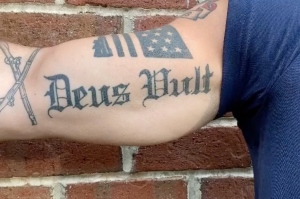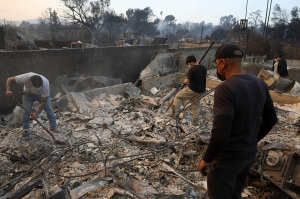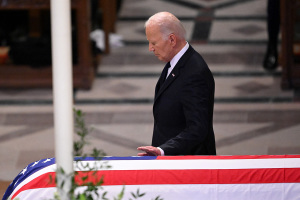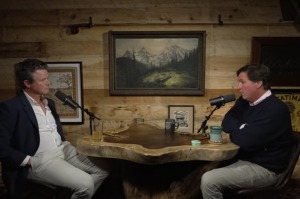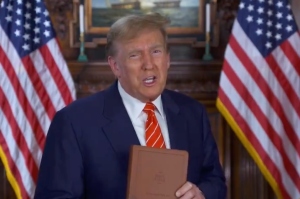Biden remembers Carter as 'faithful servant of God and the people'
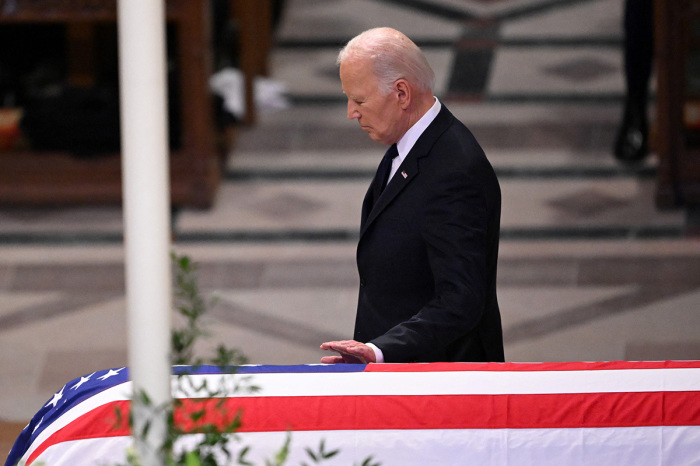
President Joe Biden referred to the late former President Jimmy Carter as a “faithful servant of God and the people” as he and others reflected on his legacy at his state funeral service.
The state funeral for the former U.S. president was held at the National Cathedral in Washington, D.C., on Thursday. Carter died last month at 100, nearly 44 years after his term as the 39th president ended. Carter was the oldest living former president at the time of his death and the longest-lived former president in U.S. history. He also had the longest post-presidency in U.S. history.
In addition to his political career as the governor of Georgia and president, Carter is remembered as an outspoken Christian. Biden touched upon the late president’s Christian faith as he delivered a eulogy at the service.
“Keeping faith in the best of humankind and the best of America is the story, in my view, from my perspective, of Jimmy Carter’s life,” Biden asserted. He remembered Carter as a man “driven and devoted to making real the words of his Savior the ideals of this nation.”
Biden detailed how “Jimmy held a deep Christian faith in God that his candidacy spoke and wrote about: faith as the substance of things hoped for and evidence of the things not seen, faith founded on the commandments of Scripture.” He specifically highlighted the former president’s commitment to the commandments to “love the Lord thy God with all thy heart and all thy mind and all thy soul” and to “love thy neighbor as thyself.”
“Throughout his life, he showed us what it means to be a practitioner of good works and a good and faithful servant of God and the people,” Biden contended. “He showed us how character and faith start with ourselves and then flows to others.”
Defining a good life as one where “we share the better parts of ourselves — joy, solidarity, love, commitment — not for reward but in reverence to the incredible gift of life we’ve all been granted, to make every minute of our time here on Earth count,” Biden remarked, “that’s the life Jimmy Carter lived during his 100 years.”
Biden directed his message “to anyone in search of meaning and purpose,” urging them to “study the power of Jimmy Carter’s example.” Biden concluded his remarks by expressing confidence that Carter had been reunited with his late wife, former first lady Rosalynn Carter, in the afterlife and, quoting from the Prophet Micah, cited Carter as an example of someone who “did justly, loved mercy, [and] walked humbly.”
Besides Biden, additional speakers who delivered eulogies at the service included Carter’s grandson Joshua, former U.S. Ambassador to the United Nations, the Rev. Andrew Young, and Steven Ford, son of former President Gerald Ford, who Carter defeated in the 1976 presidential election.
In his remarks, Young outlined “the sensitivity, the spirituality that made James Earl Carter a truly great president.” He specifically detailed his ability to maintain simultaneous friendships with the sheriff of Sumter County, Georgia, once dubbed by Martin Luther King Jr. as “the meanest man in the world,” and African Americans, who constituted a majority in his native Plains.
“James Earl Carter was truly a child of God,” Young stated. “It was President James Earl Carter that, for me, symbolized the greatness of the United States of America.”
Young expressed gratitude that despite growing up in the Great Depression, “He never wavered from his commitment to God Almighty and his love of all of God’s children.” Characterizing Carter as “a blessing that helped to create a great United States of America,” he told his late friend, “You have been a blessing from God and your spirit will remain with us.”
Ford, in his message, focused on the Carter children, reflecting on how, around 18 years ago, at the time of his father’s state funeral, “It was your dad and his great faith that supported my mom and gave her hope that week. He (Carter) traveled with us for several days and we were blessed.”
During his speech, Joshua Carter elaborated on the role his grandfather’s faith played throughout his life. “My grandfather started teaching Sunday school when he was a midshipman in the Naval Academy,” he said. “He taught the Bible every Sunday from World War II to COVID.”
“For all my grandfather’s travels, he structured his life so that he was home in Plains to teach at Maranatha on Sunday. It was central to his life,” he explained. “Every time I went to church with him, it was packed. The line started before sunrise, and I was always very thankful that I got to walk in with my grandmother.”
Carter discussed how his grandfather’s Sunday school lessons attracted people from all over the U.S. and the world, and often generated breaking news, such as the death of his brother and the former president’s grandson, Jeremy, and his winning a Nobel Peace Prize. He remembered that the day his brother died was a Sunday because “it was the only time my grandfather was ever late to teach.”
“My grandfather spent the entire time I’ve known him helping those in need,” Carter added. “He built houses for people who needed homes. He eliminated diseases in forgotten places. He waged peace anywhere in the world, wherever he saw a chance.”
After stressing how “he loved people,” Carter noted how his grandfather identified the fact that he “worshiped the Prince of Peace and commended Him” as the “one simple reason” why he took those actions.
Carter concluded his remarks by sharing his late grandfather’s favorite Bible verse, which he described as “the bedrock of my grandfather’s faith.” The Bible verses, 1 Romans 8:1-18 and 38-39, talk about the conflict between “the law of the spirit of life” and the “law of sin and death” as well as how “if Christ is in you, your body is dead because of sin, yet your spirit is alive because of righteousness.”
Another one of the former president’s grandsons, Jason Carter, also delivered a eulogy. He described his late grandfather’s life as “a testament to the goodness of God.” He maintained, “My grandparents did fundamentally live their lives, as the Bible says, to do justice, love mercy and walk humbly with their God.”
He described his grandfather’s life as a “love story” between him and other humans, which he characterized as a fulfillment of the commandment to “Love your neighbor as yourself.”
“I believe that that love is what taught him and told him to preach the power of human rights, not just for some people but for all people. It focused him on the power and the promise of democracy, its love for freedom, its requirement and founding belief in the wisdom of regular people raising their voices and the requirement that you respect all of those voices, not just some.”
Ryan Foley is a reporter for The Christian Post. He can be reached at: ryan.foley@christianpost.com

















